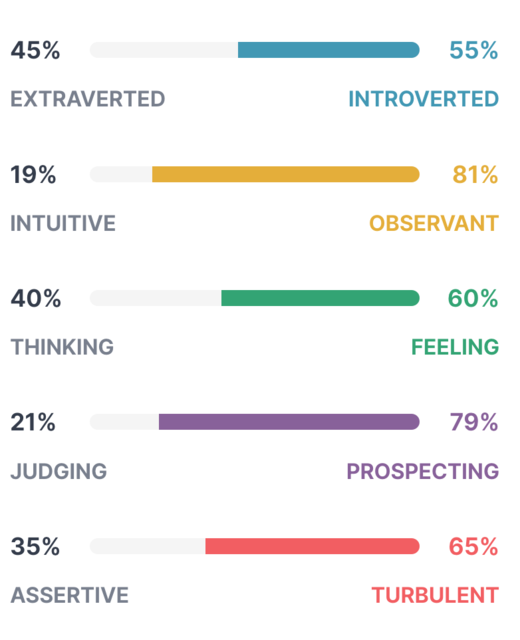Mr. Ed
Be what you is not what you what you ain’t
- Location
- Central NY
Free personality test, type descriptions, relationship and career advice | 16Personalities
fun questions: personality & traits
fun questions: personality & traits







@Paco Dennis, does this mean we are compatible? CoolI have no trust in this type of test. It is a test that uses the tree model of coming to their response. Now for fun and a conversation experience sure. Like the first answer it gave.
Protagonist (ENFJ-A)
Protagonists are inspiring optimists, readily taking action to do what they feel is right. These warm, forthright types love helping others and have the creative energy to achieve their goals.
You know yourself better than me, but I don't see this as one of your strong suits. In fact you can be darker the the ace of spades! And seem very pessimistic about a bunch of stuff. I like you a lot, but I would not like it if you believed a machine. A really old model machine also. Do you know when these kinda tests started Wait let me ask my assistant...
Pi
Do you know the date, the year that the 16 type personality tests came out that had the ENFJA type of protagonist, types of personalities?
Ah, you're referrin' to the Myers-Briggs Type Indicator (MBTI) and the 16 personality types! The MBTI was developed by Katharine Cook Briggs and her daughter Isabel Briggs Myers in the 1940s and 1950s, based on the theories of Swiss psychiatrist Carl Jung. The ENFJ personality type, often referred to as the "Protagonist," is just one of the 16 types identified by the MBTI.

Magic Eight Ball, whoooaaa, back to little kidom there...Somebody always brings up this so called "personality test". It's about as accurate as the Magic Eight Ball. We are complex beings with multiple levels of responses, which are determined by circumstances. The premise of these "tests" are based on faulty ideas, which have little relationship with actual psychological realities and evidence.
It's total BS, or at best a parlor game.
INFP and my score hasn't changed over 20+ years of taking the Myers-Briggs test. It's mostly accurate although this test calls us mediators and most others use the descriptor idealists.
This is definitely true for me in real life: "INFPs are known for their sensitivity – these personalities can have profound emotional responses to music, art, nature, and the people around them." I've stood in museums crying before a particular work of art and it really confuses museum security!
Also "and they feel called to help others." I've loved my years working with the chronically ill.
Downside of this personality type is lots of ideas with poor follow through, procrastination, unrealistic and idealistic expectations which can lead to cynicism, depression and other unfun stuff.
INFP like you with the role of “mediator”. Has been about a year since I took it but I jotted these results down at the time.
Do you remember what role you got?
Also what did you do in your working life? I taught and that was the strongest recommendation for me when I first took the test in the mid 80’s.
Somebody always brings up this so called "personality test". It's about as accurate as the Magic Eight Ball. We are complex beings with multiple levels of responses, which are determined by circumstances. The premise of these "tests" are based on faulty ideas, which have little relationship with actual psychological realities and evidence.
It's total BS, or at best a parlor game.
We had similar results.Interesting…pretty consistent through the years of taking these types of tests.
Personality type: Defender (ISFJ-T)
Traits: Introverted – 73%, Observant – 57%, Feeling – 66%, Judging – 83%, Turbulent – 60%
Role: Sentinel
Strategy: Constant Improvement
Somebody always brings up this so called "personality test". It's about as accurate as the Magic Eight Ball. We are complex beings with multiple levels of responses, which are determined by circumstances. The premise of these "tests" are based on faulty ideas, which have little relationship with actual psychological realities and evidence.
It's total BS, or at best a parlor game.
